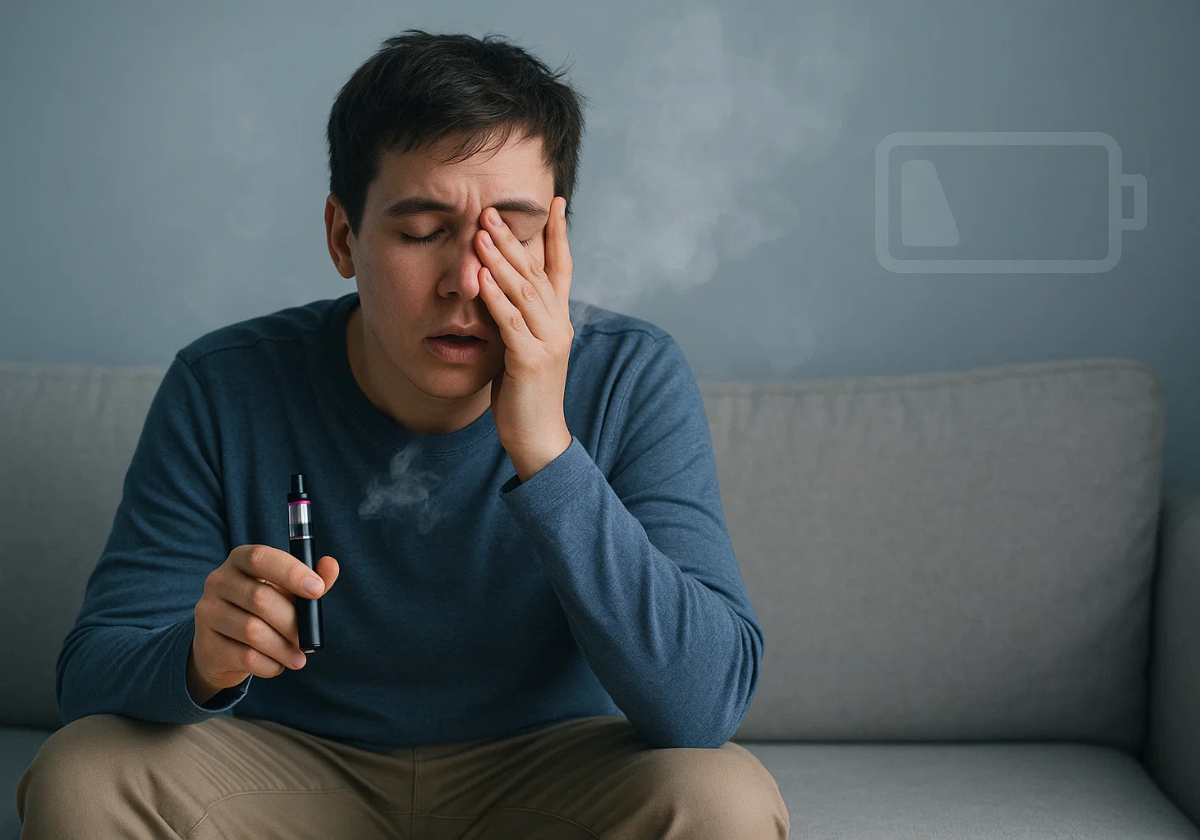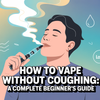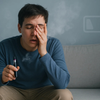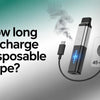Does Vaping Make You Tired? Here's What You Should Know

If you've ever felt unexpectedly drowsy or drained after a vaping session, you're not alone. It's a complaint I hear surprisingly often—people reach for their vape expecting a quick pick-me-up, only to find themselves yawning an hour later or struggling to keep their eyes open.
While vaping is commonly associated with increased alertness (thanks to nicotine's stimulant properties), the reality is more complicated. Your body's response to vaping can swing both ways, and for many people, tiredness is a very real side effect.
So why does something meant to wake you up sometimes do the exact opposite? The answer involves nicotine's dual nature, how your body processes it, and several surprising factors like dehydration and sleep disruption that most vapers don't consider.
In this article, I'll walk you through exactly why vaping might be making you tired, what's happening inside your body when that fatigue hits, and—most importantly—what you can do about it.
Understanding How Vaping Affects Your Body
Before we dive into the fatigue piece, it helps to understand what's actually happening when you vape. Whether you’re using a cheap THC vape or a nicotine device, the process is similar—nicotine doesn’t just sit passively in your system; it triggers a cascade of reactions that affect everything from your brain chemistry to your blood flow.
How Nicotine Works as a Stimulant
When you inhale vapor containing nicotine, it reaches your brain in about 10 seconds—faster than most other delivery methods. Once there, it binds to nicotinic receptors and triggers the release of several neurotransmitters, including dopamine (the "feel-good" chemical) and norepinephrine (which increases alertness and heart rate). This is why those first few puffs can feel so satisfying and energizing.
Your adrenal glands also get involved, releasing adrenaline that temporarily boosts your energy, sharpens your focus, and elevates your mood. It's the reason many people reflexively reach for their vape when they need to concentrate or power through a task.
But here's the catch: This energy boost is incredibly short-lived. Nicotine has a half-life of about two hours, meaning your body eliminates it relatively quickly. What goes up must come down, and that dopamine and adrenaline spike? It's often followed by a crash that leaves you feeling more tired than before you vaped — especially if you're using cheap carts that deliver inconsistent nicotine levels and lower-quality ingredients.
Why You Might Feel Tired After Vaping
The tiredness after vaping isn't just about the nicotine crash, though that's certainly part of it. Several interconnected factors contribute to that sluggish, low-energy feeling:
The Nicotine Crash Effect: After that initial energy spike, your neurotransmitter levels drop back down—sometimes below baseline. Your body essentially borrowed energy it didn't have, and now it's time to pay it back. This can leave you feeling mentally foggy and physically drained.
Dehydration: This one surprises people. The propylene glycol and vegetable glycerin in vape liquid are hygroscopic, meaning they pull moisture from your surroundings—including your mouth, throat, and respiratory system. Even mild dehydration can cause fatigue, headaches, and difficulty concentrating. If you're not actively replacing those fluids, you're setting yourself up for tiredness.

Reduced Oxygen Flow: Nicotine causes your blood vessels to constrict, which can reduce the amount of oxygen-rich blood reaching your tissues and organs. Less oxygen means less energy at the cellular level, which translates to that overall feeling of being drained or weak after vaping.
Blood Sugar Fluctuations: Nicotine affects how your body regulates blood sugar. It can cause temporary spikes and subsequent drops in glucose levels, which directly impacts your energy. If you're vaping on an empty stomach or haven't eaten in a while, this effect can be even more pronounced—especially when using flavorful options like a Granddaddy Purp vape, which can make you vape more frequently without realizing the impact on your blood sugar levels.
Sleep Disruption: If you vape in the evening or right before bed, the nicotine can interfere with your sleep architecture—specifically your REM sleep cycles. Even if you think you're sleeping through the night, the quality of that sleep is compromised. You wake up less rested, and that accumulated sleep debt shows up as daytime tiredness.
Common Reasons Vaping Makes You Feel Sleepy or Drained
Let's get more specific about the situations and habits that most commonly lead to vape-related fatigue.
Nicotine Overuse
This is probably the biggest culprit. High-nicotine devices (like disposable vapes with 50mg nicotine salts) or chain vaping throughout the day can overstimulate your nervous system. Your body gets flooded with nicotine, and instead of the pleasant alertness you're seeking, you experience dizziness, nausea, and profound fatigue. It's essentially nicotine poisoning on a mild scale—your system is overwhelmed and responds by shutting down.
I've talked to people who vape constantly throughout the day and wonder why they feel perpetually exhausted. They're essentially keeping their body in a constant state of stimulation and crash, never allowing their natural energy regulation to kick in.
Dehydration from Vaping
This deserves its own section because it's so commonly overlooked. Those vape ingredients I mentioned—propylene glycol especially—are really effective at absorbing moisture. If you're a regular vaper and you're not consciously increasing your water intake, you're almost certainly mildly dehydrated much of the time.
Dehydration doesn't just make you thirsty. It causes fatigue, brain fog, difficulty concentrating, and even mood changes. Your blood becomes slightly thicker, your heart has to work harder to pump it, and your cells don't function as efficiently. All of this adds up to feeling tired and sluggish — and if you’re a Pineapple Express vape user, you might not even realize vaping is the underlying cause.
Lack of Sleep or Rest
Nicotine has a much longer impact on your sleep than most people realize. Even if you stop vaping a few hours before bed, the nicotine and its metabolites can still be in your system, affecting your ability to fall into deep, restorative sleep stages.
REM sleep is particularly vulnerable to nicotine's effects. This is the stage where your brain consolidates memories and processes emotions. When nicotine disrupts REM cycles—something users of stimulating products like the Blue Dream vape may also experience—you might sleep for eight hours but wake up feeling like you barely rested. Over time, this sleep debt accumulates, and you find yourself inexplicably tired during the day—even though you're technically getting enough hours in bed.
Nicotine Withdrawal
Here's something that catches people off guard: if you've recently cut back on vaping, switched to a lower nicotine strength, or changed devices, your body might be experiencing mild withdrawal. Fatigue is one of the primary withdrawal symptoms, along with irritability, difficulty concentrating, and increased appetite.
This is especially common for people who've been vaping regularly and then try to quit or significantly reduce their intake. Your body has adapted to a certain nicotine level, and when that supply is reduced, it takes time to recalibrate. During that adjustment period, tiredness is completely normal—frustrating, but normal.
How to Prevent Tiredness from Vaping
The good news is that vape-induced fatigue isn't inevitable. There are several practical steps you can take to minimize or eliminate that tired, drained feeling.
Adjust Your Nicotine Strength
If you're using a high-nicotine device (especially 50mg nicotine salts), consider stepping down to a lower concentration. The intense nicotine hit might feel satisfying in the moment, but it's more likely to cause that energy crash afterward. Many people find that switching to 25mg or even lower significantly reduces fatigue without sacrificing satisfaction.
You might need to vape slightly more frequently with lower nicotine levels to feel satisfied, but the trade-off is more stable energy throughout the day. Think of it like drinking coffee—one espresso shot might give you a jolt followed by jitters and a crash, while a regular cup of coffee or a smooth 1 gram cartridge session provides steadier, more sustained energy.
Stay Hydrated
This is non-negotiable if you're a regular vaper. Make it a habit to drink water throughout the day—not just when you feel thirsty. A good rule of thumb is to drink a glass of water for every hour you're awake, and add extra if you're vaping heavily.
Keep a water bottle with you, set reminders on your phone if you need to, and pay attention to signs of dehydration like dry mouth, dark urine, or headaches. Proper hydration alone can make a dramatic difference in your energy levels and how you feel after vaping.

Moderate Your Vaping Habits
Chain vaping—taking puff after puff without breaks—is a fast track to overstimulation and fatigue. Your body doesn't have time to process the nicotine between sessions, so you end up in a constant state of spike and crash.
Try spacing out your vaping sessions. Take a few puffs from your 2g disposable, then put the device down for 30 minutes or an hour. This gives your body time to metabolize the nicotine and maintains more stable energy levels throughout the day.
Also, establish a vaping cut-off time in the evening—ideally at least three hours before bed. This gives the nicotine time to clear your system and minimizes sleep disruption. Whether you’re using Hybrid Carts or other vape products, try to avoid them close to bedtime. Yes, it can be tough at first if you're used to vaping right up until bedtime, but the improvement in sleep quality (and next-day energy) is worth it.
Improve Sleep Hygiene
Beyond just stopping vaping earlier in the evening, focus on overall sleep quality. Keep your bedroom cool and dark, avoid screens for an hour before bed, and try to maintain a consistent sleep schedule even on weekends. If you’re using sativa carts, remember they can have energizing effects, so it’s best to use them earlier in the day to avoid disrupting your nighttime rest.
If you find it difficult to wind down without vaping, consider switching to a nicotine-free vape in the evening, or try other relaxation techniques like reading, stretching, or meditation. The goal is to break the association between nicotine and relaxation, because ironically, nicotine is actually interfering with your ability to truly relax and get restorative sleep.
Does Nicotine Always Cause Fatigue?
Not exactly—it's more nuanced than that. The relationship between nicotine and energy is complicated and depends heavily on dosage, frequency, and individual factors.
Short-Term Boost vs Long-Term Impact
In the short term, nicotine absolutely can boost alertness and energy. That's not a myth. The problem is that this effect is temporary and comes with a rebound. Occasional nicotine use—say, once every few days—might give you that boost without significant fatigue afterward because your body isn't adapted to it.
But with regular use, especially daily vaping, the pattern shifts. Your baseline energy levels start to depend on nicotine. Instead of feeling energized after vaping, you feel normal—and without it, you feel tired. You're no longer getting an energy boost; you're just maintaining a level that should be your natural state.
The Role of Tolerance
Frequent vapers develop tolerance quickly. Your brain adjusts to regular nicotine exposure by downregulating nicotinic receptors—basically, it becomes less sensitive to nicotine's effects. To achieve the same level of stimulation, you need more nicotine, which increases the risk of side effects like fatigue, dehydration, and overstimulation. This tolerance buildup is similar to what some users experience with Indica carts, where consistent use can reduce the intensity of relaxation effects over time.
This creates a frustrating cycle: you vape more to combat tiredness, but the increased vaping actually contributes to feeling more tired overall. Breaking this cycle usually requires either cutting back significantly or taking a tolerance break to let your receptors recover.
When to Seek Medical Advice
For most people, vape-related tiredness is annoying but manageable with the strategies I've outlined. However, there are situations where persistent fatigue warrants a conversation with a healthcare provider.
If you're experiencing extreme fatigue that doesn't improve after adjusting your vaping habits, staying hydrated, and improving your sleep, something else might be going on. Nicotine sensitivity varies widely between individuals, and some people simply can't tolerate it well. Others might have underlying health conditions—like anemia, thyroid issues, or cardiovascular problems—that are being exacerbated by vaping or by using stronger products like Delta King Uppercut, which can intensify nicotine’s effects for some users.
You should definitely talk to a doctor if you're experiencing:
- Persistent tiredness that interferes with daily activities
- Chest pain or heart palpitations along with fatigue
- Severe dizziness or difficulty breathing
- Fatigue that began or worsened significantly after starting vaping
- Signs of nicotine poisoning (nausea, vomiting, confusion, rapid heartbeat)
Don't ignore your body's signals. While vaping is generally considered less harmful than smoking, it's not without risks, and fatigue can sometimes be an early warning sign that something needs attention.
Expert Insight — Understanding Vape Induced Fatigue
Health experts and researchers have been studying nicotine's effects on energy and overall health for decades. According to the CDC, nicotine is a highly addictive stimulant that affects the central nervous system, and while it can temporarily increase alertness, regular use disrupts normal brain chemistry and can lead to dependence. Brands like Delta King often highlight these discussions when addressing the balance between stimulation and wellness in nicotine-related products.
Research published by the National Institutes of Health has shown that nicotine affects sleep architecture, particularly reducing REM sleep duration and quality. This sleep disruption accumulates over time and is a significant contributor to daytime fatigue among regular nicotine users.
Medical professionals also point out that the rapid delivery of nicotine through vaping—faster than traditional cigarettes in many cases—intensifies both the initial stimulant effect and the subsequent crash. This can create a more pronounced cycle of energy spikes and fatigue compared to other forms of nicotine consumption.
The consensus among health experts is clear: while occasional, low-dose nicotine use might not cause significant fatigue, regular vaping—especially with high-nicotine devices—is very likely to disrupt energy levels, sleep quality, and overall wellbeing.
FAQs
Why Does Vaping Make You Feel Tired If It's A Stimulant?
Nicotine gives a quick boost in energy but fades fast, causing a “crash” as dopamine and adrenaline levels drop. It also constricts blood flow, dehydrates you, and disrupts sleep — all of which can leave you feeling tired despite its stimulant effects.
How Can I Stop Feeling Tired After Vaping?
Lower your nicotine level, stay hydrated, avoid chain vaping, and stop vaping at least 3 hours before bed. Get enough sleep and eat regularly to keep your energy stable. If fatigue continues, consider cutting back or taking a break.
Can Occasional Vaping Still Affect My Energy?
Yes, though less than daily use. Occasional vaping can still cause mild fatigue from dehydration, nicotine crashes, or poor sleep if you vape before bed. However, infrequent users usually recover faster between sessions.
Can Quitting Vaping Make You Tired Too?
Yes. Fatigue is a common nicotine withdrawal symptom and can last 2–4 weeks. It happens as your brain adjusts to working without nicotine. Energy usually improves gradually as your body balances itself again.
Does Vaping Make You Tired in the Morning?
If you vaped the night before, yes. Nicotine can disrupt REM sleep, leaving you groggy even after a full night’s rest. Morning tiredness can also stem from mild overnight withdrawal.
Does Nicotine Make You Sleepy or Alert?
Both — it first boosts alertness and focus, then causes a crash that makes you feel drained. With regular use, your body builds tolerance, so nicotine eventually causes more fatigue than stimulation.
How Long After Quitting Vaping Will I Stop Feeling Tired?
Fatigue usually peaks within 3–5 days after quitting and improves within 2–3 weeks. Full recovery of energy and sleep quality can take a few months, depending on usage and health.
Does Vaping THC Make You Tired?
Yes. THC often causes relaxation and drowsiness, especially with indica strains. While some sativas feel energizing at first, THC can still reduce REM sleep and cause next-day grogginess with frequent use.





